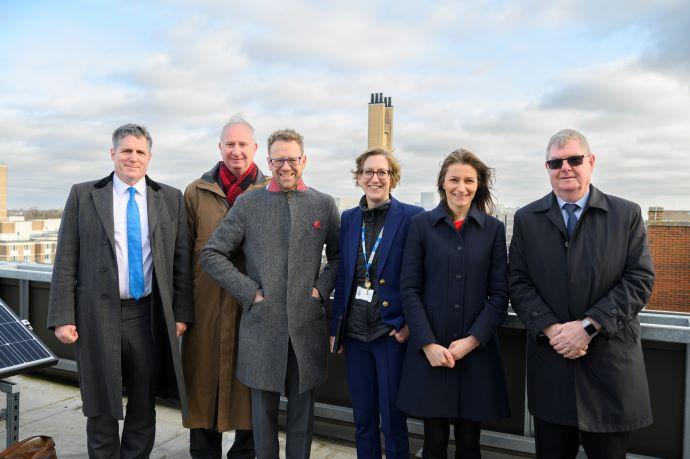The Minister, who is responsible for the New Hospital programme, toured the Addenbrooke’s site with staff and patients to discuss the developing plans for this regional, specialist cancer hospital, ahead of the main site pre-construction works starting this summer.
This brand new hospital will bring NHS staff from Addenbrooke’s Hospital and world-class scientists from the University of Cambridge and its Cancer Research UK Cambridge Centre together, into one seven-story 27,100 m2 building. With its world leading expertise in early detection and personalised medicine, the hospital aims to have global benefits.
Lord Markham met Roland Sinker, Chief Executive of Cambridge University Hospitals NHS Foundation Trust, and David Cardwell, Pro-Vice Chancellor for Strategy and Planning at the University of Cambridge, to discuss the recent milestones the programme has reached, following approval of its Outline Business Case last summer.
He spent time talking to staff and patients involved in finalising the designs for the new hospital, and was shown first-hand how Cambridge Cancer Research Hospital will help fast-track collaborations between patients, hospital staff, world-class scientists and industry partners to improve patient care across the region, the UK and beyond.
Lord Markham who was joined by local MPs Anthony Browne, Lucy Frazer and Daniel Zeichner, also met staff members from both research and clinical care to hear about some of the innovative work already being delivered in Cambridge.
Lord Markham, Parliamentary Under-Secretary of State at the Department of Health and Social Care, said:
“It was fantastic to visit the preparatory works already underway on the Cambridge Biomedical Campus, and the site for the Cambridge Cancer Research Hospital.
“I have enjoyed meeting patients and NHS staff in Cambridge today and seeing for myself the progress being made on plans for this state-of-the-art new research hospital. This is part of our commitment to deliver 40 new hospitals by 2030, which is expected to be backed by more than £20 billion of infrastructure investment.
“It was also a privilege to learn more about the innovative work already happening here – and the difference it is making to patients. When it opens, the new cancer research hospital will build on this success, bringing together specialist NHS staff, researchers and scientists in a shared mission to improve cancer detection and pioneer treatments that will save more lives in the East of England and beyond.”
Roland Sinker, Chief Executive of Cambridge University Hospitals NHS Foundation Trust said:
“We were really pleased to be able to welcome Lord Markham and his colleagues to Cambridge, and show the significant progress we’re making to build our new specialist cancer hospital for the region.
“It was a hugely positive visit, and we were delighted to introduce Lord Markham to patients and staff who could share their own experiences and showcase some of the innovations being delivered in Cambridge to improve patient care.
“Cambridge Cancer Research Hospital will not only join up a range of cancer services, currently spread across different parts of Addenbrooke’s Hospital, it will enable us to detect cancer earlier, treat it more precisely and save more lives.”
A busy programme of enabling works will begin on the future Cambridge Cancer Research Hospital site this summer, next to Astrazeneca, Royal Papworth Hospital and Addenbrooke’s Hospital. The construction work will include installing hoardings, site clearance and excavation, undertaking various surveys, checking water and electricity supplies and an archaeological dig.
Work has already started on a new car park on an adjacent site, which was granted planning permission last year. This will free up the main site of Cambridge Cancer Research Hospital, which currently houses a staff car park, ahead of the planned enabling works.
Cambridge Cancer Research Hospital is set to be the first hospital built, out of a total of seven in the East of England by 2030, as part of the Government’s New Hospital Programme, now backed by £20 billion of investment in infrastructure.
The approval of the Outline Business Case last summer means that ministers have already reviewed the plans and determined that the facility will meet the needs of staff and patients across the East of England.



